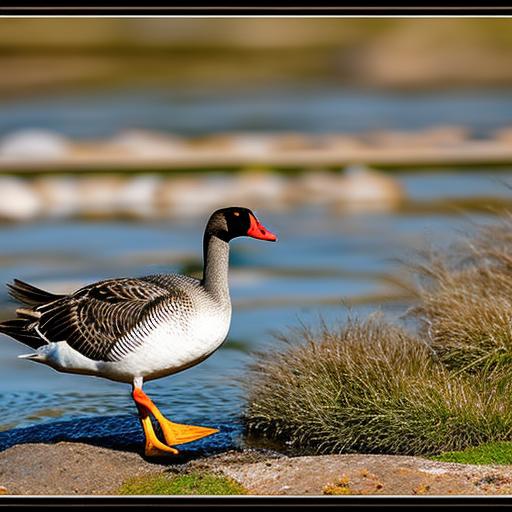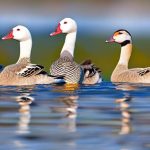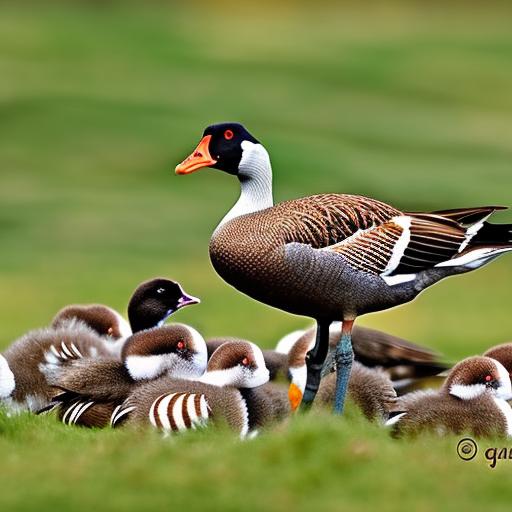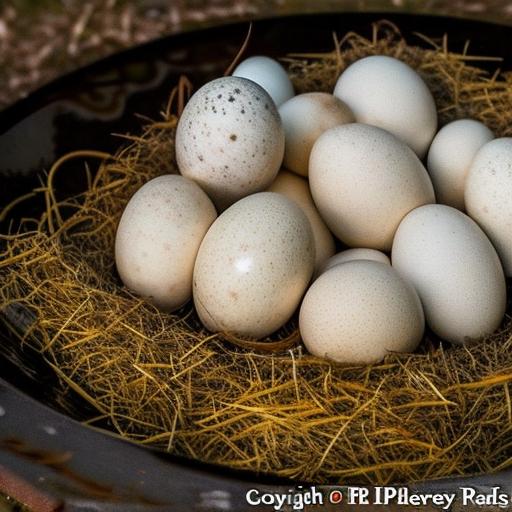Goose breeding is an important aspect of poultry farming that requires a good understanding of the basics. Whether you are a beginner or an experienced farmer, it is crucial to have a solid foundation in goose breeding to ensure the success and productivity of your flock. This article will provide a comprehensive guide to understanding the basics of goose breeding, including the different types of geese, their breeding cycle, common mistakes to avoid, selecting the right breeding stock, creating a suitable breeding environment, nutritional needs, hygiene practices, maximizing fertility and hatching rates, managing common health issues, the role of genetics, and tips for harvesting and marketing your breeding geese.
Key Takeaways
- Understanding the basics of goose breeding is important for successful breeding.
- Common mistakes to avoid when breeding geese include overcrowding and poor nutrition.
- Selecting the right breeding stock for your flock is crucial for producing healthy offspring.
- Creating a suitable breeding environment for geese involves providing adequate space and nesting areas.
- Essential nutritional needs for breeding geese include a balanced diet with adequate protein and vitamins.
Understanding the Basics of Goose Breeding
Geese come in various breeds, each with its own unique characteristics. Some popular breeds include Toulouse, Embden, Chinese, and African geese. Toulouse geese are known for their large size and calm temperament, making them ideal for meat production. Embden geese are also large but have a more active disposition, making them suitable for both meat and egg production. Chinese geese are smaller in size and known for their excellent egg-laying abilities. African geese are similar to Chinese geese but have a more aggressive temperament.
The breeding cycle of geese differs from other poultry in that they have a longer incubation period. Geese typically lay their eggs in the spring and incubate them for about 30 days before hatching. During this time, it is important to provide the right conditions for successful incubation. Additionally, selecting the right breed for your goals is crucial. If you are primarily interested in meat production, choosing a breed like Toulouse or Embden would be ideal. However, if you are more focused on egg production, Chinese or African geese would be better suited for your needs.
Common Mistakes to Avoid When Breeding Geese
When starting out with goose breeding, it is common for new breeders to make certain mistakes. One of the most common mistakes is not being patient enough. Breeding geese requires time and consistency, and expecting immediate results can lead to frustration. It is important to understand that geese have their own natural breeding cycle and it may take some time before you see the desired outcomes.
Another mistake to avoid is not providing adequate space for your geese. Geese require ample space to roam and graze, as well as a suitable nesting area. Overcrowding can lead to stress and aggression among the birds, which can negatively impact their breeding behavior. It is important to provide enough space for each bird and ensure they have access to clean water and a balanced diet.
Selecting the Right Breeding Stock for Your Flock
Choosing the right breeding stock is crucial for the success of your flock. When selecting breeding birds, it is important to consider their genetic traits and overall health. Look for birds that are healthy, have good body conformation, and exhibit desirable traits such as good egg-laying ability or meat production.
Genetics play a significant role in determining the traits of offspring, so it is important to evaluate potential breeding birds based on their genetic background. Consider factors such as the breed’s history, performance records, and any known genetic issues. By selecting birds with desirable genetic traits, you can improve the overall quality of your flock and increase productivity.
Creating a Suitable Breeding Environment for Geese
Creating a suitable breeding environment is essential for successful goose breeding. Geese require ample space to roam and graze, so it is important to provide a large outdoor area for them to exercise and forage. This will not only keep them physically fit but also stimulate their natural breeding behaviors.
In addition to outdoor space, geese also need a suitable nesting area. Provide nesting boxes or shelters where they can lay their eggs and incubate them in a safe and comfortable environment. The nesting area should be clean, dry, and well-protected from predators.
Essential Nutritional Needs for Breeding Geese

Proper nutrition is crucial for the health and productivity of breeding geese. A balanced diet that meets their nutritional needs is essential for successful breeding. Geese require a diet that is high in protein, vitamins, and minerals to support egg production and overall health.
Feed your geese a commercial poultry feed that is specifically formulated for breeding birds. This feed should contain the necessary nutrients, including protein, calcium, and vitamins. Additionally, provide access to fresh water at all times, as geese require plenty of water for digestion and overall hydration.
The Importance of Proper Hygiene in Goose Breeding
Maintaining a clean and hygienic breeding environment is essential for the health and well-being of your geese. Dirty or unsanitary conditions can lead to the spread of diseases and infections among the flock. Regularly clean the nesting areas, remove any feces or debris, and provide fresh bedding material.
It is also important to practice good biosecurity measures to prevent the introduction and spread of diseases. Limit access to your flock by outsiders, quarantine new birds before introducing them to the flock, and regularly monitor the health of your geese.
Maximizing Fertility and Hatching Rates in Geese
To maximize fertility and hatching rates in geese, it is important to understand proper breeding techniques and timing. Geese are seasonal breeders, with most breeds being most fertile in the spring. During this time, ensure that your breeding stock is healthy and well-fed to optimize their reproductive capabilities.
To increase fertility rates, it is recommended to have a ratio of one gander (male) to every three to five geese (females). This will ensure that each female has adequate attention from the male and increase the chances of successful mating.
Identifying and Managing Common Health Issues in Breeding Geese
Breeding geese can be susceptible to various health issues, so it is important to be able to identify and manage these issues promptly. Common health issues in breeding geese include respiratory infections, egg-binding, and nutritional deficiencies.
Respiratory infections can be caused by poor ventilation or exposure to cold and damp conditions. Symptoms include coughing, sneezing, and difficulty breathing. If you notice any signs of respiratory illness, isolate the affected bird and consult a veterinarian for proper diagnosis and treatment.
Egg-binding occurs when a female goose is unable to lay her eggs. This can be caused by various factors such as stress, nutritional deficiencies, or anatomical abnormalities. If you suspect egg-binding, gently examine the bird and seek veterinary assistance if necessary.
The Role of Genetics in Successful Goose Breeding
Genetics play a crucial role in successful goose breeding. By selecting breeding stock with desirable genetic traits, you can improve the overall quality of your flock and increase productivity. Consider factors such as egg-laying ability, meat production, temperament, and overall health when selecting breeding birds.
It is also important to avoid breeding closely related birds to prevent inbreeding and the associated genetic issues. Keep detailed records of your breeding program to track the genetic traits of your flock and make informed decisions for future breeding.
Harvesting and Marketing Your Breeding Geese: Tips for Success
Once your geese have reached maturity and have successfully bred, it is time to harvest and market your breeding geese. It is important to approach this process with ethical and humane practices. Ensure that the birds are handled with care and respect throughout the harvesting process.
When marketing your breeding geese, consider targeting niche markets such as local restaurants or specialty stores that value high-quality poultry products. Highlight the unique characteristics of your geese, such as their breed, feeding practices, and overall quality. Building relationships with potential customers and providing exceptional customer service will help you establish a loyal customer base.
Goose breeding is a rewarding and fulfilling endeavor that requires a good understanding of the basics. By understanding the different types of geese, their breeding cycle, common mistakes to avoid, selecting the right breeding stock, creating a suitable breeding environment, providing proper nutrition and hygiene, maximizing fertility and hatching rates, managing common health issues, understanding the role of genetics, and implementing successful harvesting and marketing strategies, you can embark on a successful goose breeding journey. With patience, consistency, and a commitment to providing the best care for your flock, you can enjoy the benefits of raising healthy and productive geese.
If you’re interested in breeding geese, it’s important to educate yourself on the best practices to avoid deadly mistakes. One helpful resource is an article titled “Breeding Geese: Avoid Deadly Mistakes” from Poultry Wizard. This article provides valuable insights and tips for successful goose breeding, covering topics such as selecting the right breed, creating a suitable environment, and ensuring proper nutrition. To learn more about breeding geese and how to avoid common pitfalls, check out the article here.
FAQs
What are some common mistakes to avoid when breeding geese?
Some common mistakes to avoid when breeding geese include overcrowding, improper nutrition, lack of clean water, and inadequate shelter.
How can overcrowding affect geese breeding?
Overcrowding can lead to stress, aggression, and the spread of diseases among geese. It can also result in poor egg production and lower hatch rates.
What kind of nutrition do geese need for successful breeding?
Geese require a balanced diet that includes protein, carbohydrates, vitamins, and minerals. They should have access to fresh grass, grains, and clean water at all times.
Why is clean water important for geese breeding?
Clean water is essential for geese breeding because it helps maintain their health and hygiene. Dirty water can lead to the spread of diseases and infections, which can be fatal for geese.
What kind of shelter do geese need for breeding?
Geese need a shelter that provides protection from the elements, predators, and other potential threats. The shelter should be well-ventilated, spacious, and easy to clean. It should also have nesting boxes for egg-laying geese.
Meet Walter, the feathered-friend fanatic of Florida! Nestled in the sunshine state, Walter struts through life with his feathered companions, clucking his way to happiness. With a coop that’s fancier than a five-star hotel, he’s the Don Juan of the chicken world. When he’s not teaching his hens to do the cha-cha, you’ll find him in a heated debate with his prized rooster, Sir Clucks-a-Lot. Walter’s poultry passion is no yolk; he’s the sunny-side-up guy you never knew you needed in your flock of friends!







